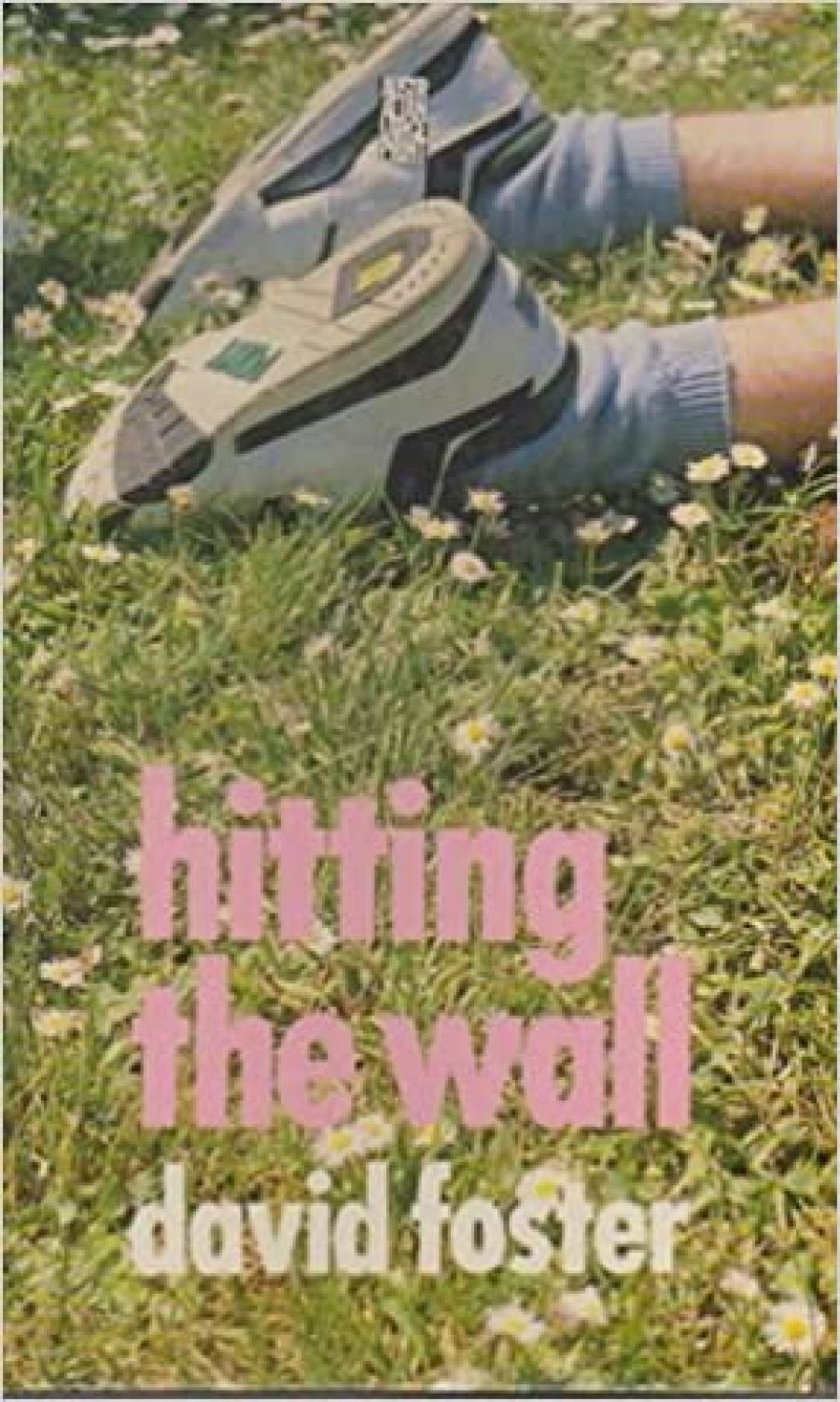
- Free Article: No
- Contents Category: Fiction
- Review Article: Yes
- Online Only: No
- Custom Highlight Text:
I have often found myself feeling a little frustrated after reading a David Foster novel. While never doubting his ability as a writer, the convolutions of his narrative have, more than once, overshadowed his undeniably fine prose. His latest book, Hitting the Wall, a collection of two novellas, allows us the opportunity to examine how Foster handles the more urgent needs of this much shorter form.
- Book 1 Title: Hitting the Wall
- Book 1 Biblio: Penguin, 140 pp, $11.99 pb
Billy, the small-time crim in ‘The Job’, is unable to break out of the lifestyle which has already landed him once in gaol. Unable to entertain the thought of a conventional job, he lives off his wits, content for the most part to drift from one situation to the next, making little effort beyond his regular nights of safe breaking. Billy, in fact, is addicted to ‘the job’, describing how, when he was on a job, his heart would beat ‘as though I had dosed up on methedrine, attuned to the spirit of the night’.
‘The Job’ opens as Billy is released from gaol. A few hundred metres from the gates, he accepts a lift from Brian in a beaten up old car. Brian soon talks Billy into taking part in a series of robberies. But as time passes with nothing to show but an amateurish attempt on the local RSL, we realise that Billy is simply a plaything for Brian – that a game is being played out that has been played out many times before. Billy himself recognises this early on when he thinks: ‘You tell yourself you’re learning, you’re changing, but you’re not learning and you’re not changing very much, except that you feel increasingly tired.’
‘The Job’ is, in fact, built on repetition. Billy is befriended by Brian and when Brian disappears Billy finds himself taking his place. He begins living with Brian’s wife in Brian’s house and begins sleeping with his mistress. In the end, it is the same need that Brian felt to ‘escape’ which takes Billy back to the road leading past the gaol looking for a hitchhiker just out of gaol.
Stylistically, Foster has kept a tight rein over this earlier of the two novellas in Hitting the Wall. The language, at times, seems a little forced, and overall I felt that ‘The Job’ could indeed benefit from one final, thorough edit. ‘The Job’ is obviously a carefully planned work, and one is always aware of Foster leading the narrative in a wide circle. Halfway through the novella it became clear that he is leading us back to the beginning.
‘Eye of the Bull’, by comparison, is much more stylistically relaxed, and this has a lot to do with the subject matter. Whereas Billy in ‘The Job’ returns to his starting point, Wilson runs virtually in a straight line from beginning to end. It may also have something to do with Foster’s maturity as a writer. The thirteen years which separate ‘The Job’ from ‘Eye of the Bull’ have been prolific for Foster, and one can perhaps argue that the smoothness of ‘Eye of the Bull’ is, in part, a result of Foster’s growing confidence in his own ability.
Wilson is obviously suffering from a midlife crisis. Concerned that he is in a dead end he throws in his job and moves his family to the countryside outside a city that is obviously Canberra. The clichéd midlife crisis tale continues when Wilson leaves his wife and family for a much younger woman. While ‘Eye of the Bull’ could easily have become a formula story of an ageing man attempting to rediscover his youth, Foster has tackled the subject with sensitivity and originality. The endlessly jogging Wilson still emerges from the novella as a pathetic character but his pathos is edged with a hint of tragic heroism.
Foster has always attempted to inject an element of humour into his work. While this humour has sometimes sat quite awkwardly in novels such as Plumbum, in ‘Eye of the Bull’ the humour grows naturally out of a situation without becoming obtrusive.
While highlighting some of his recurring concerns, the two novellas in Hitting the Wall, also provide us with an opportunity to examine how Foster has developed as a writer over the last decade or so. The achievement of ‘Eye of the Bull’ suggests that Foster is at his best when he distances himself slightly from the text and works with a relatively uncomplicated narrative. It will be interesting to see whether Foster will continue this approach in his next novel.


Comments powered by CComment